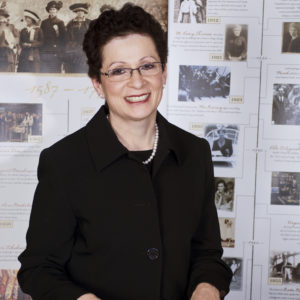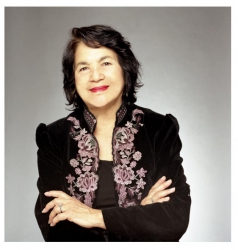We’re All Wonder Women!



Jill S. Tietjen, PE, is an author, national speaker, and…
The protagonist of the movie Wonder Woman fearlessly pursues her passion. Many women on whose shoulders we all stand pursued their passions as well – passions that have provided significant benefits for society as a whole. In this month’s column, we profile some wonder women who changed the world. We are pleased to feature Eliza Lucas Pinckney, Harriet Beecher Stowe, Rosa Parks, Annie Dodge Wauneka, and Dolores Huerta. Let’s share their stories.

Born in about 1722, Eliza Lucas Pinckney was running three plantations in what is today South Carolina when she was a teenager! The family had moved from the West Indies to the colonies in hopes of restoring her mother’s health. Pinckney was quite enterprising and encouraged by her father, who was in military service in Antigua, she experimented with a variety of crops. The demand for rice had decreased and the British wanted a supply of indigo which was not provided by the French. Pinckney’s perseverance in experimentation was rewarded – the 1744 indigo crop was a good success. Indigo would sustain the economy of the Carolinas (not yet split into North and South) for thirty years, until the advent of the Revolutionary War. After she married, Pinckney had four children, three of whom survived to adulthood. One son would sign the U.S. Constitution. The other would serve as governor of South Carolina. When Pinckney died, General George Washington requested that he be a pallbearer at her funeral.

The loss of her son and the enactment of the Fugitive Slave Act of 1850 pushed author Harriet Beecher Stowe into action. Grieving her son and, now, believing she had insight into the emotions that slave families experienced when they were separated, she wrote Uncle Tom’s Cabin. Initially it was published in installments in the antislavery newspaper National Era. The book was issued in 1852 and quickly became a bestseller both in the U.S. and worldwide. Stowe became famous and wealthy as well. Within a year, it had sold 300,000 copies. It was translated into 60 languages. During the Civil War, President Abraham Lincoln is rumored to have said upon meeting her “So you are the little lady that started this Great War.” Stowe has been inducted into the National Women’s Hall of Fame.

When Rosa Parks refused to give up her seat to a white man on a Montgomery, Alabama city bus, she initiated a series of actions that led to significant changes in laws and behavior in Alabama and around the U.S. The so-called “Mother of the Civil Rights Movement,” Parks moved to Montgomery when she was young. Jim Crow laws dictated the conduct and actions of African-Americans and Caucasians, alike. Parks had joined the local chapter of the NAACP in 1943 and served as chapter secretary. On December 1, 1955, the bus driver asked Parks and three other people to move from the front row of the bus’s black section to make room for white patrons. Parks refused. Her arrest and conviction led to a bus boycott that lasted for more than a year – until the U.S. Supreme Court ruled that bus segregation was illegal. The boycott was led by Dr. Martin Luther King, Jr. “People always say that I didn’t give up my seat because I was tired,” wrote Parks in her autobiography, “but that isn’t true. I was not tired physically … No, the only tired I was, was tired of giving in.”
Fired from her job and facing harassment, Parks and her husband moved to Detroit. There she spent over thirty years working for Congressman John Conyers. Parks received the Congressional Gold Medal and has been inducted into the National Women’s Hall of Fame. When she died, she became the first woman in our nation’s history to lie in state at the U.S. Capitol.

The second woman elected to the Navajo Tribal Council, Annie Dodge Wauneka used her knowledge of English and Navajo to bring significant health care advances to the reservation. After her election to the Council in 1951, she was asked to address the spread of tuberculosis on the reservation. She compiled an English-Navajo dictionary to allow doctors to communicate with her people. Her efforts led to eradication of tuberculosis, a significant reduction in infant mortality and numerous other health care advances. She earned a B.S. in public health later in her life. Honored and respected for serving as a bridge between her people and the white population, Wauneka was the first Native American to receive the Presidential Medal of Freedom. In 1984, the Navajo Tribal Council named her “Our Legendary Mother.” Recipient of several honorary doctorates, Wauneka has been inducted into the National Women’s Hall of Fame.

Labor activist Dolores Huerta decided to help the families of the students she was teaching after seeing them come to school hungry and barefoot. In California in 1962, with Cesar Chavez, she founded the organization that is today known as the United Farm Workers. In 1965, she directed the boycott of the Delano Grape Strike, which took the issues facing migrant farmers to the consumers. In 1970, the entire California grape industry signed a three-year collective bargaining agreement. Huerta has been arrested twenty-two times for her participation in strikes and non-violent civil disobedience activities. In 2002, she founded the Dolores Huerta Foundation which was established to create leadership opportunities for community organizing, leadership development, civic engagement and public advocacy in the areas of health and environment, education and youth development. The recipient of the Presidential Medal of Freedom, Huerta has been inducted into the National Women’s Hall of Fame and is active advocating for social justice today.
These women changed the world. They and many other wonder women across all fields of endeavor – more than 850 all together – are profiled in our book, Her Story: A Timeline of the Women Who Changed America. Help us by continuing to tell women’s stories and write women back into history!
Charlotte S. Waisman, Ph.D., and Jill S. Tietjen, P.E., co-authors of Her Story: A Timeline of the Women Who Changed America (HarperCollins) and recipients of the Daughters of the American Revolution History Award Medal. Charlotte is a national champion and advocate for women as a professor and keynote speaker. A corporate leader, executive coach, and facilitator, she conducts leadership workshops nationally. Jill is an author, speaker, and electrical engineer. She has been inducted into the Colorado Women’s Hall of Fame.
Author: Jill Tietjen
Jill S. Tietjen, PE, is an author, national speaker, and an electrical engineer. After 40 years in the electric utility industry, her professional focus is now on women’s advocacy, worldwide. She blogs for The Huffington Post, speaks nationally on the accomplishments of women, nominates women for awards, and continues to write books (8 published to date), following in the footsteps of her bestselling and award-winning book, Her Story: A Timeline of the Women Who Changed America (written with Charlotte Waisman). She is a frequent keynote speaker as her positive energy and her ability to relate to the audience result in inspired and energized listeners. The recipient of many awards, her induction into the Colorado Women’s Hall of Fame in 2010 remains one of her most treasured.

Jill S. Tietjen, PE, is an author, national speaker, and an electrical engineer. After 40 years in the electric utility industry, her professional focus is now on women’s advocacy, worldwide. She blogs for The Huffington Post, speaks nationally on the accomplishments of women, nominates women for awards, and continues to write books (8 published to date), following in the footsteps of her bestselling and award-winning book, Her Story: A Timeline of the Women Who Changed America (written with Charlotte Waisman). She is a frequent keynote speaker as her positive energy and her ability to relate to the audience result in inspired and energized listeners. The recipient of many awards, her induction into the Colorado Women’s Hall of Fame in 2010 remains one of her most treasured.


